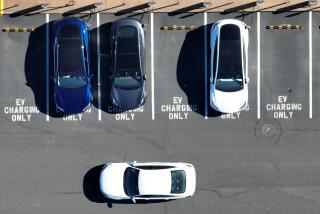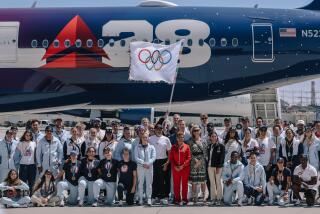Study Finds Progress, Promise in Fuel Cells : Transportation: The technology could create 70,000 Southern California jobs and be used to make pollution-free cars.
- Share via
As hearings open today on whether auto makers can put battery-powered vehicles on California highways by 1998, a new study sponsored by Los Angeles transit officials finds surprising progress--and the promise of 70,000 new Southern California jobs--in fuel cells, the technology that many expect is next down the road.
The fuel cell is a still-evolving technology that converts hydrogen and oxygen into electricity without pollution-forming combustion. And while progress has been slower than many hoped in improving electric batteries for cars, the new study--sponsored by the Los Angeles County Metropolitan Transportation Authority--finds rapid progress in fuel cells.
“We’re bullish,” Rich Davis, MTA director of equipment engineering and advanced technology, said at a technical briefing Wednesday. “There’s no question that the fuel cell will come.”
*
Indeed, many researchers see a hybrid of the two technologies as the best zero-emission vehicle over the long term, though this week’s California Air Resources Board hearings in Los Angeles will focus largely on batteries.
Fuel cells are still too expensive and heavy for widespread commercial application. In theory, they can provide more range than batteries, while batteries offer better acceleration than fuel cells alone and can store energy recaptured as vehicles brake.
Still, what was once a technology described as a decade or more away now seems much closer. Mercedes-Benz has already equipped a vehicle to run on fuel cells. Ballard Power Systems of Vancouver, British Columbia, has one operating fuel-cell bus and expects to build 20 more in the next four years. The U.S. Energy and Transportation departments are building three buses, and two European bus projects are under way as well.
Meanwhile, fuel cells are also in use as power plants, producing supplementary electricity at more than a dozen sites in Southern California, ranging from fast-food outlets to hospitals. Last month, ground was broken in Santa Clara for a utility-scale fuel-cell power plant.
All this could mean a significant infusion of jobs for the region, according to the new report by the Economic Roundtable, a nonprofit economic research group in Los Angeles.
The study finds that many of the major industries most likely to build fuel-cell parts already have a foothold in the Los Angeles area.
Of 18 industries needed to make fuel cells, seven are better represented in Southern California than elsewhere in the country, according to the study. Of those, five that would create 52% of all the new jobs--manufacturers of chemicals, plastics, electronic components, electrical equipment and industrial equipment--are more competitive than their rivals in other states in terms of labor and productivity.
“Our assumption is that these five key industries would likely be key players in a nascent fuel-cell industry,” said David L. Rigby of UCLA’s Lewis Center for Regional Policy Studies, which conducted technical and financial analysis for the study along with UC Davis’ Institute of Transportation Studies and the Union of Concerned Scientists.
Rigby acknowledged, however, that “the most difficult thing in a forecast like this is to work out the level of demand” for new technologies.
According to Project California, the blue-ribbon committee charged with developing advanced transportation and communications industries in the state, the world market for fuel cells could grow to $9 billion in transportation by the year 2007. Los Angeles itself offers an enormous market for what experts say will be the fuel cell’s first likely transportation use: buses.
Still, the Economic Roundtable study warns that Southern California manufacturers must get into the game fast, because potential rivals outside the state are already concentrating on the technology, particularly in Japan.
“The first-mover advantages are absolutely critical,” Rigby said.
Fueling Job Gains?
Fuel cells turn hydrogen into electricity--without combustion and the resulting pollution. The nonprofit Economic Roundtable predicts that as many as 70,000 jobs could be created in the Los Angeles area if a fuel-cell-powered transportation industry can be developed. Its report recommends that officials take several steps to encourage such an industry, including:
* Formation of a buyers consortium of bus, waste-collection and other municipal agencies and private fleets to create a market by buying fuel cells that meet common specifications.
* Preferential consideration for Los Angeles-area firms as fuel-cell component suppliers.
* Assistance for manufacturers seeking financing for product development.
* Streamlined, one-stop permit processing by the South Coast Air Quality Management District and other regulators for fuel-cell component manufacturers.
Source: Economic Roundtable






